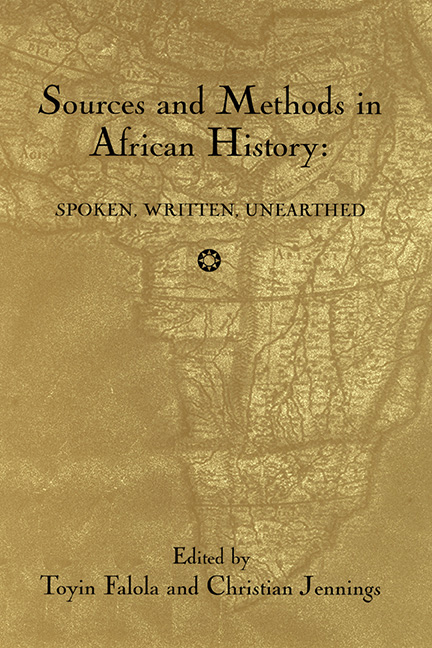Book contents
- Frontmatter
- Dedication
- Contents
- Acknowledgments
- Introduction
- Part I Archaeological Sources
- Part II Africa and the Atlantic World
- Part III Documentary Sources
- 10 Section Introduction: New Approaches to Documentary Sources
- 11 They Called Themselves Iloikop: Rethinking Pastoralist History in Nineteenth-Century East Africa
- 12 Interpreting Cases, Disentangling Disputes: Court Cases as a Source for Understanding Patron-Client Relationships in Early Colonial Lagos
- 13 Capricious Tyrants and Persecuted Subjects: Reading between the Lines of Missionary Records in Precolonial Northern Namibia
- Part IV Oral Tradition
- Part V Innovative Sources and Methods
- Contributors
- Index
11 - They Called Themselves Iloikop: Rethinking Pastoralist History in Nineteenth-Century East Africa
from Part III - Documentary Sources
Published online by Cambridge University Press: 25 October 2017
- Frontmatter
- Dedication
- Contents
- Acknowledgments
- Introduction
- Part I Archaeological Sources
- Part II Africa and the Atlantic World
- Part III Documentary Sources
- 10 Section Introduction: New Approaches to Documentary Sources
- 11 They Called Themselves Iloikop: Rethinking Pastoralist History in Nineteenth-Century East Africa
- 12 Interpreting Cases, Disentangling Disputes: Court Cases as a Source for Understanding Patron-Client Relationships in Early Colonial Lagos
- 13 Capricious Tyrants and Persecuted Subjects: Reading between the Lines of Missionary Records in Precolonial Northern Namibia
- Part IV Oral Tradition
- Part V Innovative Sources and Methods
- Contributors
- Index
Summary
Scattered along the periphery of Maasailand are several smaller communities, who are historically related to the Maasai pastoralists, and whose inhabitants speak variations of the Maa language. These peripheral communities can be quite diverse, ranging from the compact Njemps fishing and farming community at Lake Baringo in Kenya, to the widely dispersed Parakuyo pastoralists of Tanzania. Although independent in name and ethnicity, they often are remembered as sharing a vague, overarching identity, and sometimes are called by the names “Iloikop,” “Kwavi,” or “Lumbwa.” The consensus among scholars and Maasai themselves, for more than a century, has been that these peripheral communities are historically subgroups of an all-encompassing Maasai ethnicity and language dating back several hundred years. The purpose of the present essay is to challenge this “Maasai-centric” assumption, on the grounds that it is actually an inversion of the historical relationship between the groups in question: during the early nineteenth century, and probably for some time before, the pastoralists of the Rift Valley and its proximate savannas considered themselves to be Iloikop. The Maasai sections emerged from within this larger Iloikop family, and the idea of “being Maasai” itself is relatively new, perhaps developing as recently as the early nineteenth century.
The evidence for the thesis presented here is drawn primarily from the records left by the first three missionaries of the Church Missionary Society in East Africa: Johann Ludwig Krapf, Johannes Rebmann, and Jakob Erhardt. Their various journals, letters, and published articles, written during the 1840s and 1850s, are widely recognized as the earliest documentary evidence for Maasai and Iloikop history. But, as detailed later in the chapter, they have often been neglected in favor of later written or oral sources, perhaps because their views of Maasai and Iloikop history seem rather incongruous when compared to those of later writers, and even to those held by many twentieth-century Maasai themselves. The argument here is that despite the skepticism with which they have been met by later scholars, these early missionaries provided a coherent and convincing picture of Maasai and Iloikop pastoralists during the mid-nineteenth century. Given the credibility of their statements, then, the early missionary sources must be taken seriously by historians. Hopefully, the evidence presented here will provide a new appreciation for the dynamic changes that appear to have taken place in East Africa's not-so-distant past.
- Type
- Chapter
- Information
- Sources and Methods in African HistorySpoken Written Unearthed, pp. 173 - 194Publisher: Boydell & BrewerPrint publication year: 2003

